Leadership and Management Report: BMA6115 Course Analysis
VerifiedAdded on 2022/12/29
|13
|3864
|22
Report
AI Summary
This report delves into the multifaceted aspects of leadership and management, exploring various theories and practical applications. It begins by defining successful leadership, referencing theories like the Great Man Theory, Katz's Three-Skill Approach, and Lewin's leadership styles (autocratic, democratic, and laissez-faire). The report then examines the development of leadership skills, highlighting the Path-Goal Theory and Transformational leadership. The report further differentiates between leadership and management, outlining their distinct roles and functions within an organization, with a focus on the planning, organizing, and controlling aspects of management. The report draws upon real-world examples to illustrate these concepts, providing a comprehensive overview of leadership and management principles.
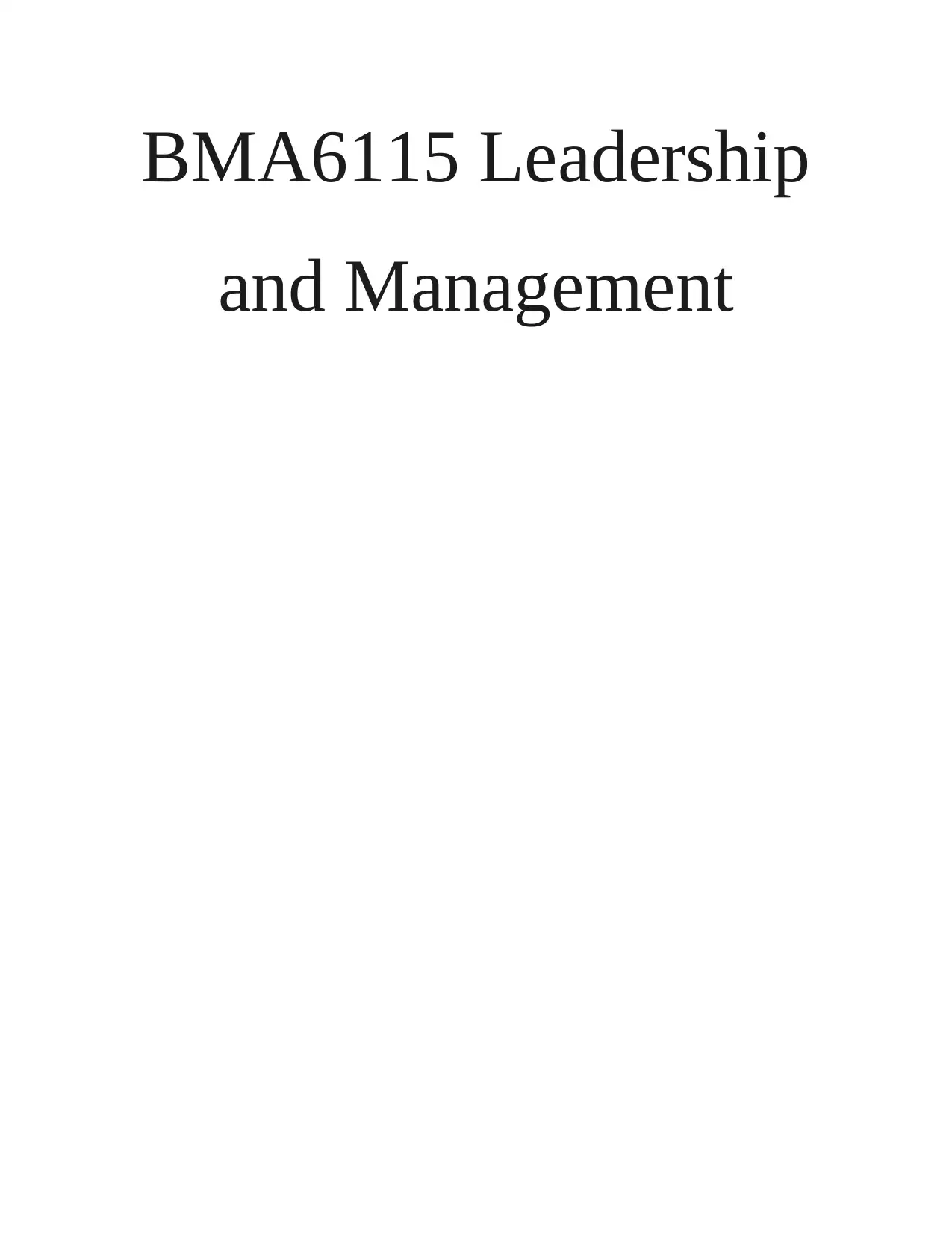
BMA6115 Leadership
and Management
and Management
Paraphrase This Document
Need a fresh take? Get an instant paraphrase of this document with our AI Paraphraser
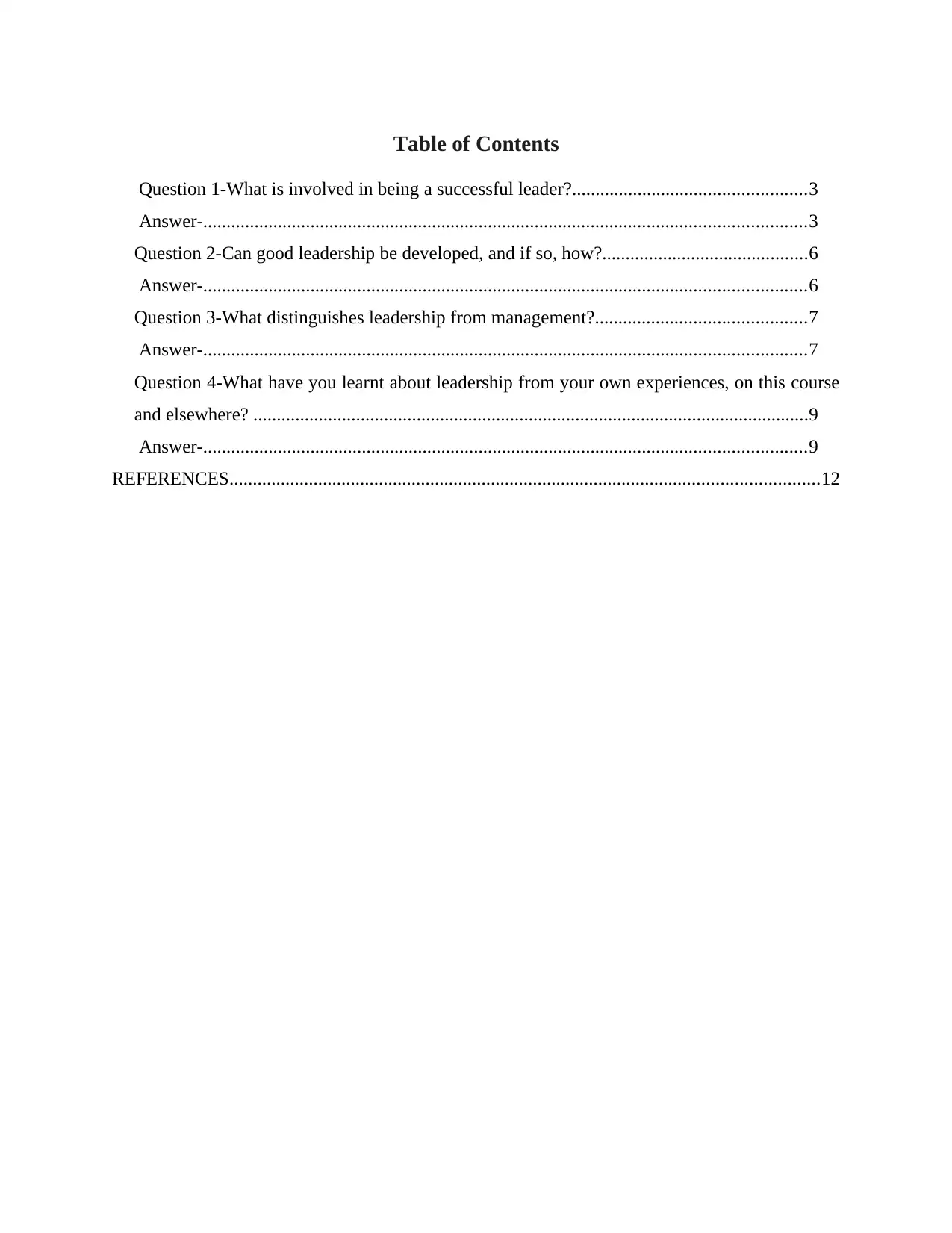
Table of Contents
Question 1-What is involved in being a successful leader?..................................................3
Answer-.................................................................................................................................3
Question 2-Can good leadership be developed, and if so, how?............................................6
Answer-.................................................................................................................................6
Question 3-What distinguishes leadership from management?.............................................7
Answer-.................................................................................................................................7
Question 4-What have you learnt about leadership from your own experiences, on this course
and elsewhere? .......................................................................................................................9
Answer-.................................................................................................................................9
REFERENCES..............................................................................................................................12
Question 1-What is involved in being a successful leader?..................................................3
Answer-.................................................................................................................................3
Question 2-Can good leadership be developed, and if so, how?............................................6
Answer-.................................................................................................................................6
Question 3-What distinguishes leadership from management?.............................................7
Answer-.................................................................................................................................7
Question 4-What have you learnt about leadership from your own experiences, on this course
and elsewhere? .......................................................................................................................9
Answer-.................................................................................................................................9
REFERENCES..............................................................................................................................12
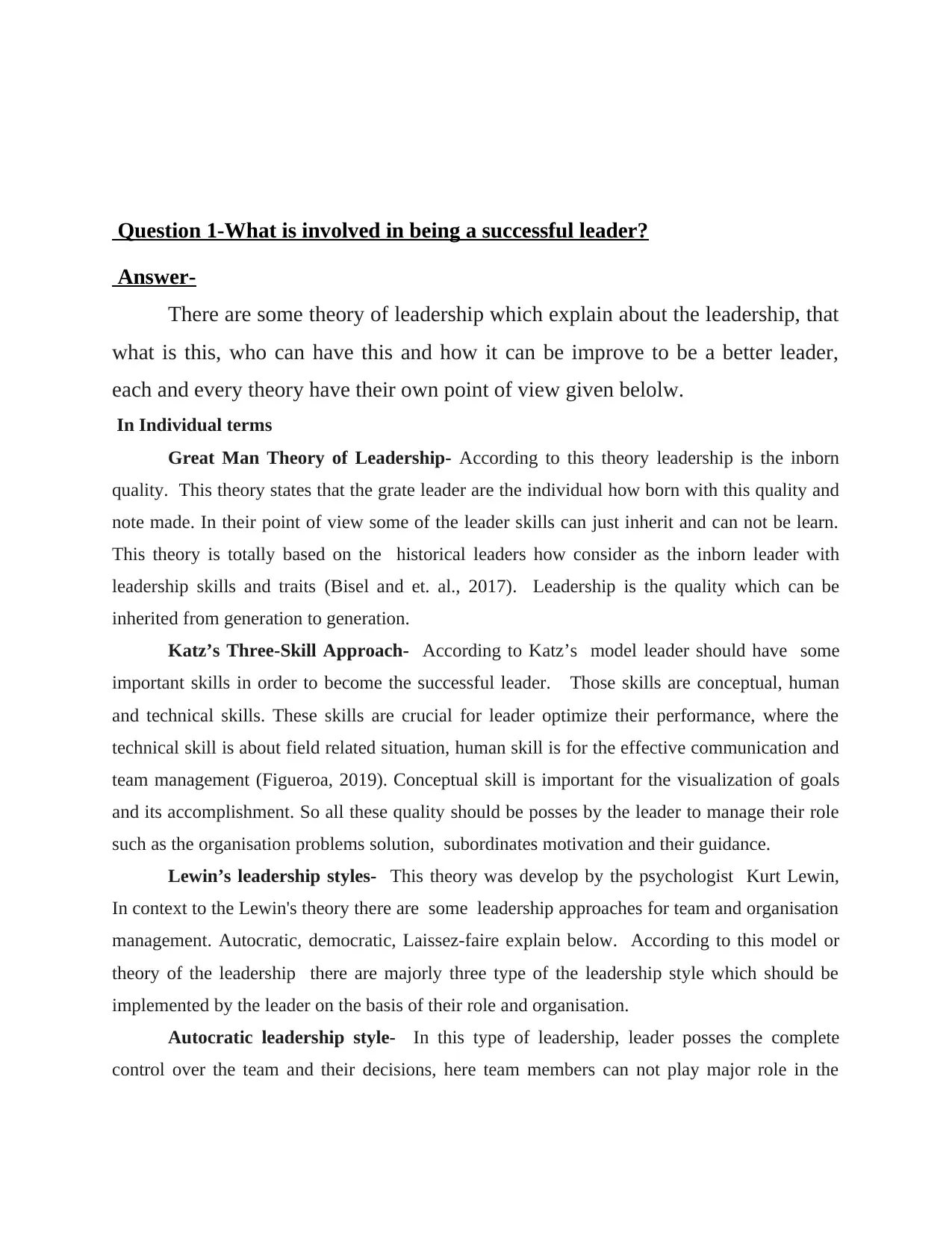
Question 1-What is involved in being a successful leader?
Answer-
There are some theory of leadership which explain about the leadership, that
what is this, who can have this and how it can be improve to be a better leader,
each and every theory have their own point of view given belolw.
In Individual terms
Great Man Theory of Leadership- According to this theory leadership is the inborn
quality. This theory states that the grate leader are the individual how born with this quality and
note made. In their point of view some of the leader skills can just inherit and can not be learn.
This theory is totally based on the historical leaders how consider as the inborn leader with
leadership skills and traits (Bisel and et. al., 2017). Leadership is the quality which can be
inherited from generation to generation.
Katz’s Three-Skill Approach- According to Katz’s model leader should have some
important skills in order to become the successful leader. Those skills are conceptual, human
and technical skills. These skills are crucial for leader optimize their performance, where the
technical skill is about field related situation, human skill is for the effective communication and
team management (Figueroa, 2019). Conceptual skill is important for the visualization of goals
and its accomplishment. So all these quality should be posses by the leader to manage their role
such as the organisation problems solution, subordinates motivation and their guidance.
Lewin’s leadership styles- This theory was develop by the psychologist Kurt Lewin,
In context to the Lewin's theory there are some leadership approaches for team and organisation
management. Autocratic, democratic, Laissez-faire explain below. According to this model or
theory of the leadership there are majorly three type of the leadership style which should be
implemented by the leader on the basis of their role and organisation.
Autocratic leadership style- In this type of leadership, leader posses the complete
control over the team and their decisions, here team members can not play major role in the
Answer-
There are some theory of leadership which explain about the leadership, that
what is this, who can have this and how it can be improve to be a better leader,
each and every theory have their own point of view given belolw.
In Individual terms
Great Man Theory of Leadership- According to this theory leadership is the inborn
quality. This theory states that the grate leader are the individual how born with this quality and
note made. In their point of view some of the leader skills can just inherit and can not be learn.
This theory is totally based on the historical leaders how consider as the inborn leader with
leadership skills and traits (Bisel and et. al., 2017). Leadership is the quality which can be
inherited from generation to generation.
Katz’s Three-Skill Approach- According to Katz’s model leader should have some
important skills in order to become the successful leader. Those skills are conceptual, human
and technical skills. These skills are crucial for leader optimize their performance, where the
technical skill is about field related situation, human skill is for the effective communication and
team management (Figueroa, 2019). Conceptual skill is important for the visualization of goals
and its accomplishment. So all these quality should be posses by the leader to manage their role
such as the organisation problems solution, subordinates motivation and their guidance.
Lewin’s leadership styles- This theory was develop by the psychologist Kurt Lewin,
In context to the Lewin's theory there are some leadership approaches for team and organisation
management. Autocratic, democratic, Laissez-faire explain below. According to this model or
theory of the leadership there are majorly three type of the leadership style which should be
implemented by the leader on the basis of their role and organisation.
Autocratic leadership style- In this type of leadership, leader posses the complete
control over the team and their decisions, here team members can not play major role in the
⊘ This is a preview!⊘
Do you want full access?
Subscribe today to unlock all pages.

Trusted by 1+ million students worldwide
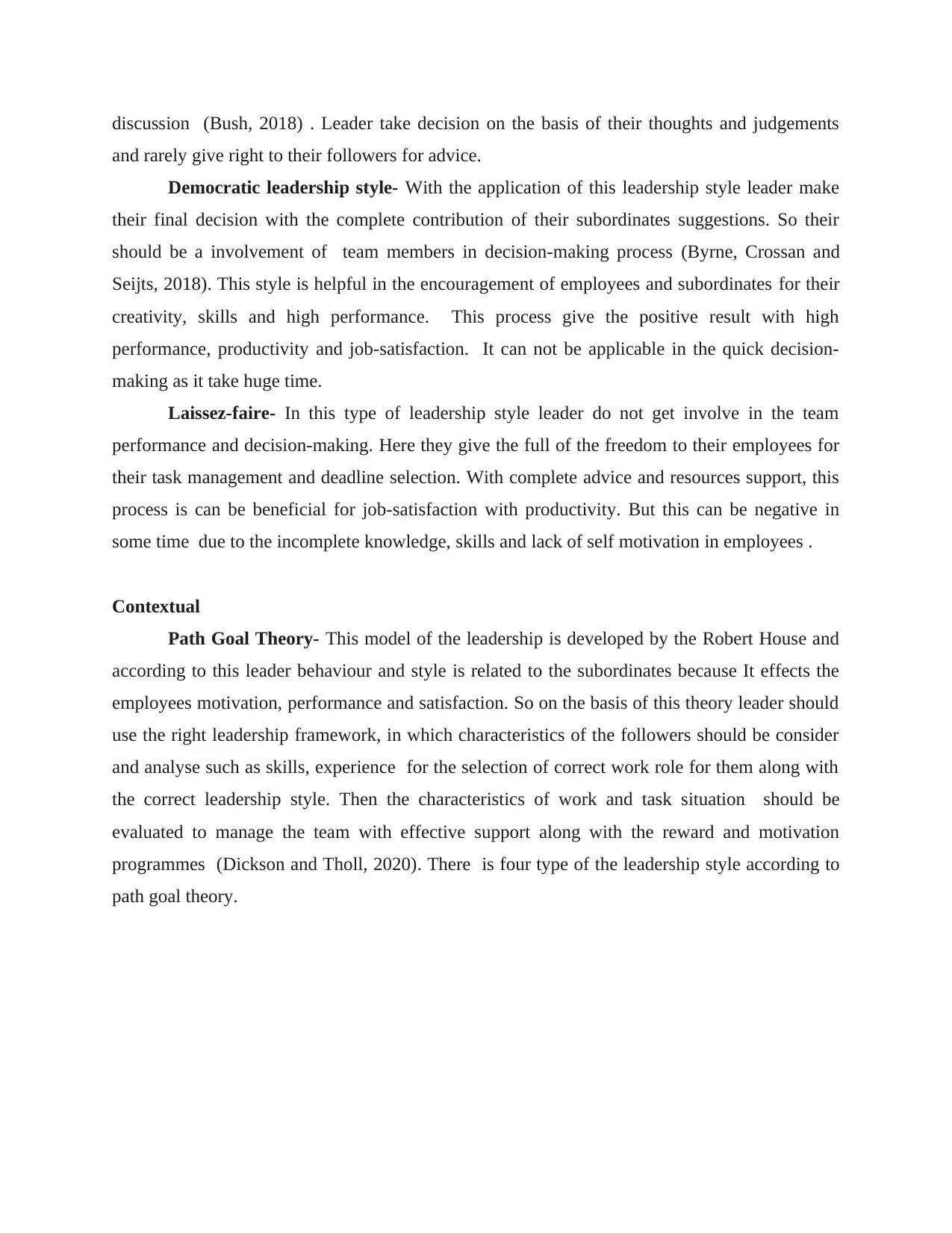
discussion (Bush, 2018) . Leader take decision on the basis of their thoughts and judgements
and rarely give right to their followers for advice.
Democratic leadership style- With the application of this leadership style leader make
their final decision with the complete contribution of their subordinates suggestions. So their
should be a involvement of team members in decision-making process (Byrne, Crossan and
Seijts, 2018). This style is helpful in the encouragement of employees and subordinates for their
creativity, skills and high performance. This process give the positive result with high
performance, productivity and job-satisfaction. It can not be applicable in the quick decision-
making as it take huge time.
Laissez-faire- In this type of leadership style leader do not get involve in the team
performance and decision-making. Here they give the full of the freedom to their employees for
their task management and deadline selection. With complete advice and resources support, this
process is can be beneficial for job-satisfaction with productivity. But this can be negative in
some time due to the incomplete knowledge, skills and lack of self motivation in employees .
Contextual
Path Goal Theory- This model of the leadership is developed by the Robert House and
according to this leader behaviour and style is related to the subordinates because It effects the
employees motivation, performance and satisfaction. So on the basis of this theory leader should
use the right leadership framework, in which characteristics of the followers should be consider
and analyse such as skills, experience for the selection of correct work role for them along with
the correct leadership style. Then the characteristics of work and task situation should be
evaluated to manage the team with effective support along with the reward and motivation
programmes (Dickson and Tholl, 2020). There is four type of the leadership style according to
path goal theory.
and rarely give right to their followers for advice.
Democratic leadership style- With the application of this leadership style leader make
their final decision with the complete contribution of their subordinates suggestions. So their
should be a involvement of team members in decision-making process (Byrne, Crossan and
Seijts, 2018). This style is helpful in the encouragement of employees and subordinates for their
creativity, skills and high performance. This process give the positive result with high
performance, productivity and job-satisfaction. It can not be applicable in the quick decision-
making as it take huge time.
Laissez-faire- In this type of leadership style leader do not get involve in the team
performance and decision-making. Here they give the full of the freedom to their employees for
their task management and deadline selection. With complete advice and resources support, this
process is can be beneficial for job-satisfaction with productivity. But this can be negative in
some time due to the incomplete knowledge, skills and lack of self motivation in employees .
Contextual
Path Goal Theory- This model of the leadership is developed by the Robert House and
according to this leader behaviour and style is related to the subordinates because It effects the
employees motivation, performance and satisfaction. So on the basis of this theory leader should
use the right leadership framework, in which characteristics of the followers should be consider
and analyse such as skills, experience for the selection of correct work role for them along with
the correct leadership style. Then the characteristics of work and task situation should be
evaluated to manage the team with effective support along with the reward and motivation
programmes (Dickson and Tholl, 2020). There is four type of the leadership style according to
path goal theory.
Paraphrase This Document
Need a fresh take? Get an instant paraphrase of this document with our AI Paraphraser
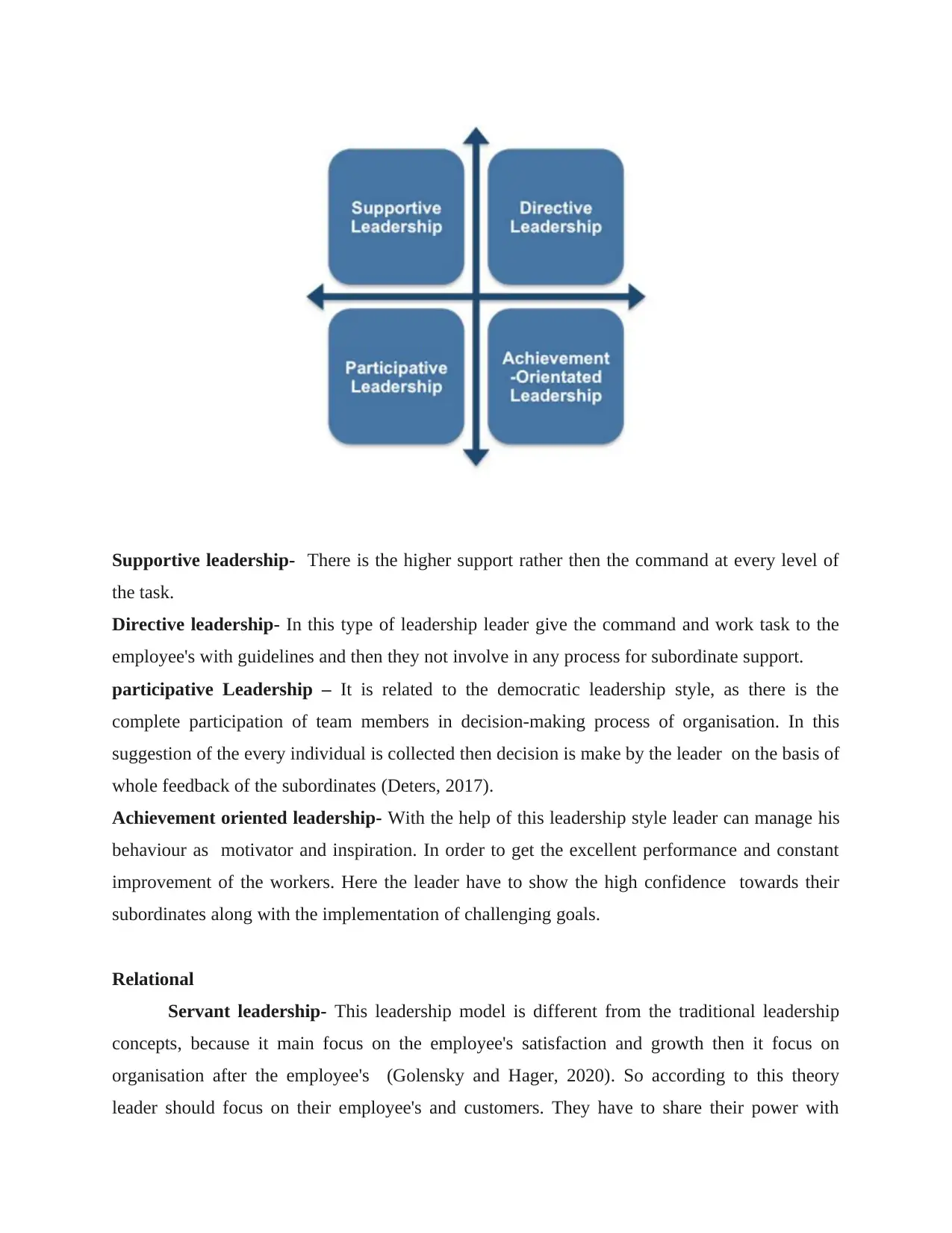
Supportive leadership- There is the higher support rather then the command at every level of
the task.
Directive leadership- In this type of leadership leader give the command and work task to the
employee's with guidelines and then they not involve in any process for subordinate support.
participative Leadership – It is related to the democratic leadership style, as there is the
complete participation of team members in decision-making process of organisation. In this
suggestion of the every individual is collected then decision is make by the leader on the basis of
whole feedback of the subordinates (Deters, 2017).
Achievement oriented leadership- With the help of this leadership style leader can manage his
behaviour as motivator and inspiration. In order to get the excellent performance and constant
improvement of the workers. Here the leader have to show the high confidence towards their
subordinates along with the implementation of challenging goals.
Relational
Servant leadership- This leadership model is different from the traditional leadership
concepts, because it main focus on the employee's satisfaction and growth then it focus on
organisation after the employee's (Golensky and Hager, 2020). So according to this theory
leader should focus on their employee's and customers. They have to share their power with
the task.
Directive leadership- In this type of leadership leader give the command and work task to the
employee's with guidelines and then they not involve in any process for subordinate support.
participative Leadership – It is related to the democratic leadership style, as there is the
complete participation of team members in decision-making process of organisation. In this
suggestion of the every individual is collected then decision is make by the leader on the basis of
whole feedback of the subordinates (Deters, 2017).
Achievement oriented leadership- With the help of this leadership style leader can manage his
behaviour as motivator and inspiration. In order to get the excellent performance and constant
improvement of the workers. Here the leader have to show the high confidence towards their
subordinates along with the implementation of challenging goals.
Relational
Servant leadership- This leadership model is different from the traditional leadership
concepts, because it main focus on the employee's satisfaction and growth then it focus on
organisation after the employee's (Golensky and Hager, 2020). So according to this theory
leader should focus on their employee's and customers. They have to share their power with
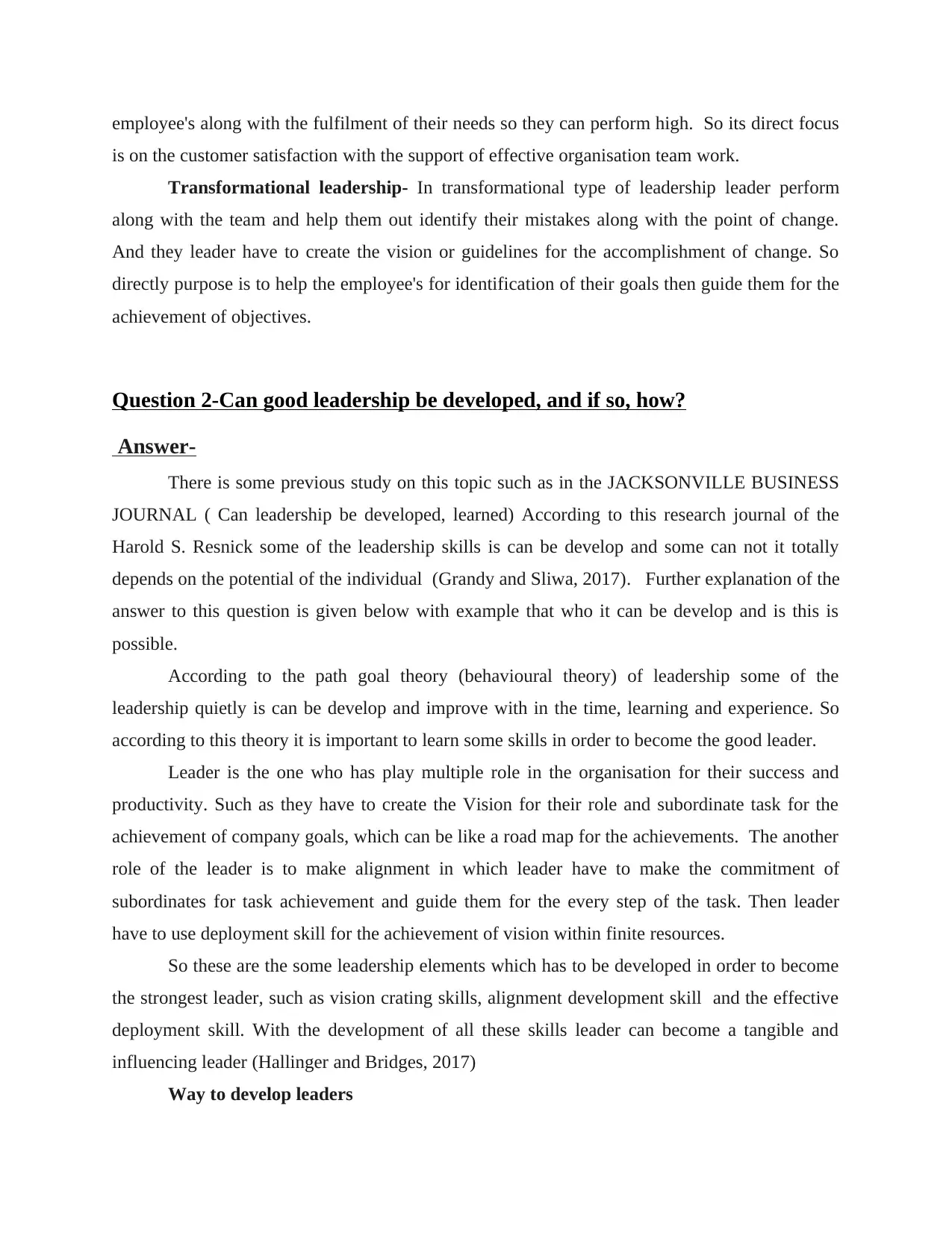
employee's along with the fulfilment of their needs so they can perform high. So its direct focus
is on the customer satisfaction with the support of effective organisation team work.
Transformational leadership- In transformational type of leadership leader perform
along with the team and help them out identify their mistakes along with the point of change.
And they leader have to create the vision or guidelines for the accomplishment of change. So
directly purpose is to help the employee's for identification of their goals then guide them for the
achievement of objectives.
Question 2-Can good leadership be developed, and if so, how?
Answer-
There is some previous study on this topic such as in the JACKSONVILLE BUSINESS
JOURNAL ( Can leadership be developed, learned) According to this research journal of the
Harold S. Resnick some of the leadership skills is can be develop and some can not it totally
depends on the potential of the individual (Grandy and Sliwa, 2017). Further explanation of the
answer to this question is given below with example that who it can be develop and is this is
possible.
According to the path goal theory (behavioural theory) of leadership some of the
leadership quietly is can be develop and improve with in the time, learning and experience. So
according to this theory it is important to learn some skills in order to become the good leader.
Leader is the one who has play multiple role in the organisation for their success and
productivity. Such as they have to create the Vision for their role and subordinate task for the
achievement of company goals, which can be like a road map for the achievements. The another
role of the leader is to make alignment in which leader have to make the commitment of
subordinates for task achievement and guide them for the every step of the task. Then leader
have to use deployment skill for the achievement of vision within finite resources.
So these are the some leadership elements which has to be developed in order to become
the strongest leader, such as vision crating skills, alignment development skill and the effective
deployment skill. With the development of all these skills leader can become a tangible and
influencing leader (Hallinger and Bridges, 2017)
Way to develop leaders
is on the customer satisfaction with the support of effective organisation team work.
Transformational leadership- In transformational type of leadership leader perform
along with the team and help them out identify their mistakes along with the point of change.
And they leader have to create the vision or guidelines for the accomplishment of change. So
directly purpose is to help the employee's for identification of their goals then guide them for the
achievement of objectives.
Question 2-Can good leadership be developed, and if so, how?
Answer-
There is some previous study on this topic such as in the JACKSONVILLE BUSINESS
JOURNAL ( Can leadership be developed, learned) According to this research journal of the
Harold S. Resnick some of the leadership skills is can be develop and some can not it totally
depends on the potential of the individual (Grandy and Sliwa, 2017). Further explanation of the
answer to this question is given below with example that who it can be develop and is this is
possible.
According to the path goal theory (behavioural theory) of leadership some of the
leadership quietly is can be develop and improve with in the time, learning and experience. So
according to this theory it is important to learn some skills in order to become the good leader.
Leader is the one who has play multiple role in the organisation for their success and
productivity. Such as they have to create the Vision for their role and subordinate task for the
achievement of company goals, which can be like a road map for the achievements. The another
role of the leader is to make alignment in which leader have to make the commitment of
subordinates for task achievement and guide them for the every step of the task. Then leader
have to use deployment skill for the achievement of vision within finite resources.
So these are the some leadership elements which has to be developed in order to become
the strongest leader, such as vision crating skills, alignment development skill and the effective
deployment skill. With the development of all these skills leader can become a tangible and
influencing leader (Hallinger and Bridges, 2017)
Way to develop leaders
⊘ This is a preview!⊘
Do you want full access?
Subscribe today to unlock all pages.

Trusted by 1+ million students worldwide
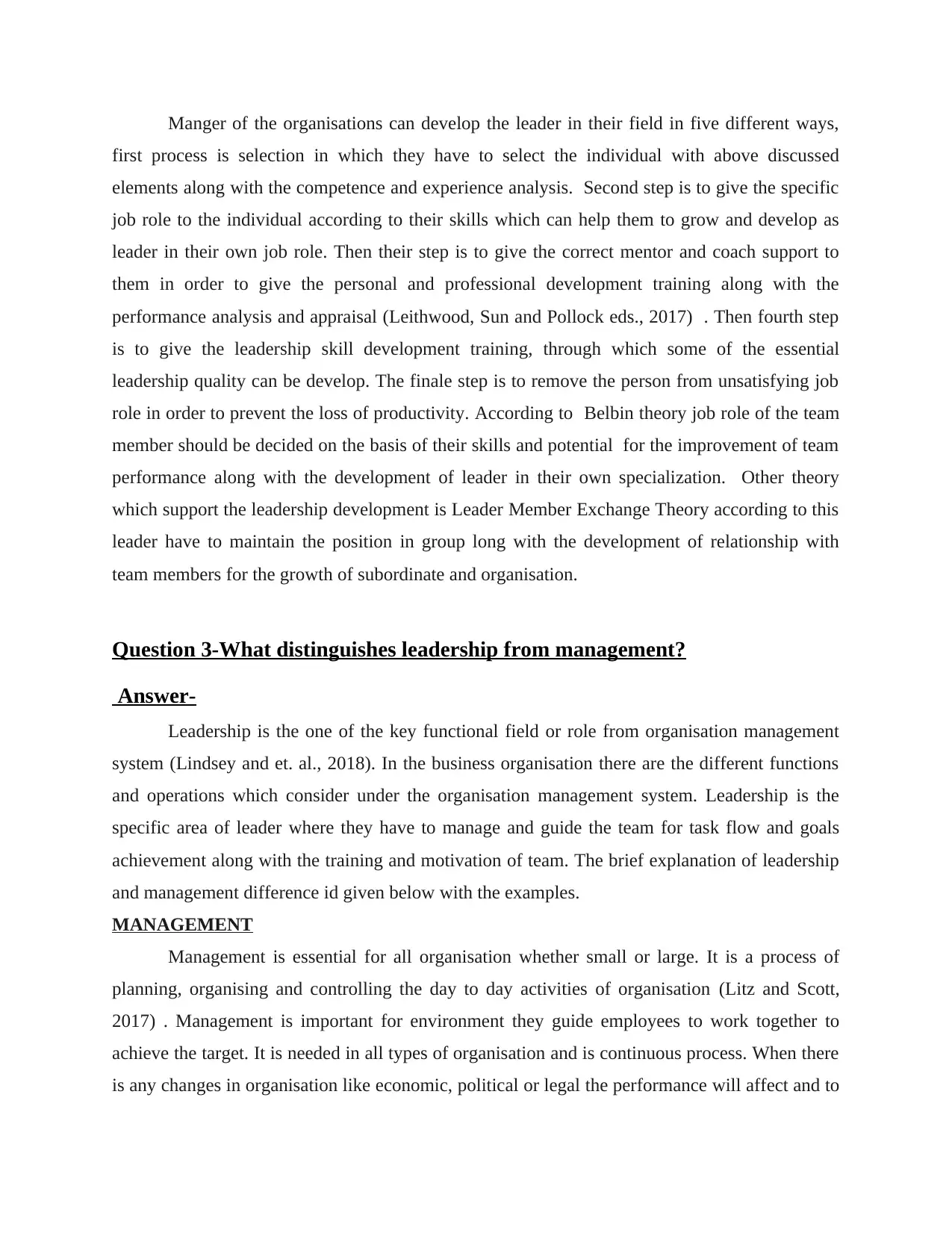
Manger of the organisations can develop the leader in their field in five different ways,
first process is selection in which they have to select the individual with above discussed
elements along with the competence and experience analysis. Second step is to give the specific
job role to the individual according to their skills which can help them to grow and develop as
leader in their own job role. Then their step is to give the correct mentor and coach support to
them in order to give the personal and professional development training along with the
performance analysis and appraisal (Leithwood, Sun and Pollock eds., 2017) . Then fourth step
is to give the leadership skill development training, through which some of the essential
leadership quality can be develop. The finale step is to remove the person from unsatisfying job
role in order to prevent the loss of productivity. According to Belbin theory job role of the team
member should be decided on the basis of their skills and potential for the improvement of team
performance along with the development of leader in their own specialization. Other theory
which support the leadership development is Leader Member Exchange Theory according to this
leader have to maintain the position in group long with the development of relationship with
team members for the growth of subordinate and organisation.
Question 3-What distinguishes leadership from management?
Answer-
Leadership is the one of the key functional field or role from organisation management
system (Lindsey and et. al., 2018). In the business organisation there are the different functions
and operations which consider under the organisation management system. Leadership is the
specific area of leader where they have to manage and guide the team for task flow and goals
achievement along with the training and motivation of team. The brief explanation of leadership
and management difference id given below with the examples.
MANAGEMENT
Management is essential for all organisation whether small or large. It is a process of
planning, organising and controlling the day to day activities of organisation (Litz and Scott,
2017) . Management is important for environment they guide employees to work together to
achieve the target. It is needed in all types of organisation and is continuous process. When there
is any changes in organisation like economic, political or legal the performance will affect and to
first process is selection in which they have to select the individual with above discussed
elements along with the competence and experience analysis. Second step is to give the specific
job role to the individual according to their skills which can help them to grow and develop as
leader in their own job role. Then their step is to give the correct mentor and coach support to
them in order to give the personal and professional development training along with the
performance analysis and appraisal (Leithwood, Sun and Pollock eds., 2017) . Then fourth step
is to give the leadership skill development training, through which some of the essential
leadership quality can be develop. The finale step is to remove the person from unsatisfying job
role in order to prevent the loss of productivity. According to Belbin theory job role of the team
member should be decided on the basis of their skills and potential for the improvement of team
performance along with the development of leader in their own specialization. Other theory
which support the leadership development is Leader Member Exchange Theory according to this
leader have to maintain the position in group long with the development of relationship with
team members for the growth of subordinate and organisation.
Question 3-What distinguishes leadership from management?
Answer-
Leadership is the one of the key functional field or role from organisation management
system (Lindsey and et. al., 2018). In the business organisation there are the different functions
and operations which consider under the organisation management system. Leadership is the
specific area of leader where they have to manage and guide the team for task flow and goals
achievement along with the training and motivation of team. The brief explanation of leadership
and management difference id given below with the examples.
MANAGEMENT
Management is essential for all organisation whether small or large. It is a process of
planning, organising and controlling the day to day activities of organisation (Litz and Scott,
2017) . Management is important for environment they guide employees to work together to
achieve the target. It is needed in all types of organisation and is continuous process. When there
is any changes in organisation like economic, political or legal the performance will affect and to
Paraphrase This Document
Need a fresh take? Get an instant paraphrase of this document with our AI Paraphraser
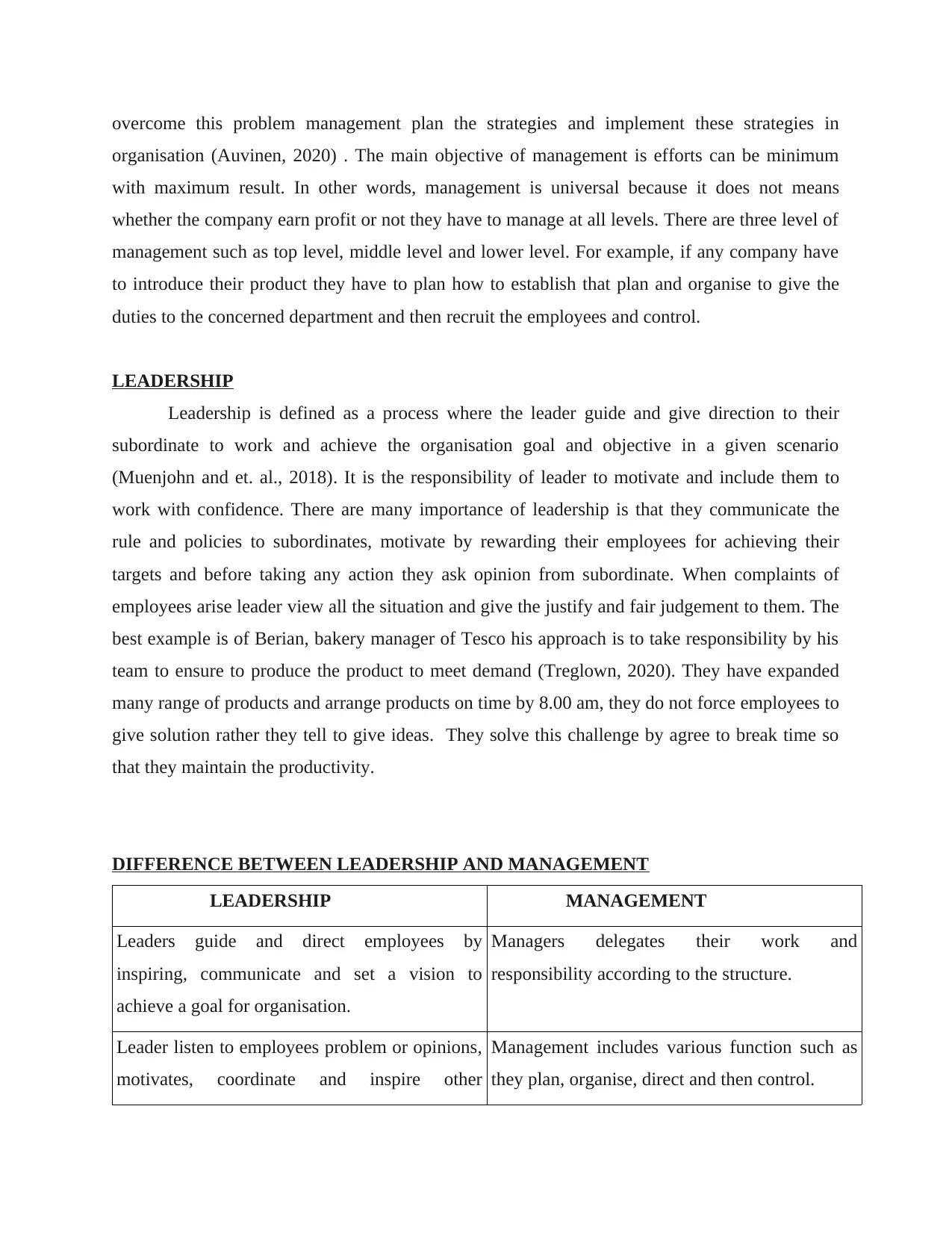
overcome this problem management plan the strategies and implement these strategies in
organisation (Auvinen, 2020) . The main objective of management is efforts can be minimum
with maximum result. In other words, management is universal because it does not means
whether the company earn profit or not they have to manage at all levels. There are three level of
management such as top level, middle level and lower level. For example, if any company have
to introduce their product they have to plan how to establish that plan and organise to give the
duties to the concerned department and then recruit the employees and control.
LEADERSHIP
Leadership is defined as a process where the leader guide and give direction to their
subordinate to work and achieve the organisation goal and objective in a given scenario
(Muenjohn and et. al., 2018). It is the responsibility of leader to motivate and include them to
work with confidence. There are many importance of leadership is that they communicate the
rule and policies to subordinates, motivate by rewarding their employees for achieving their
targets and before taking any action they ask opinion from subordinate. When complaints of
employees arise leader view all the situation and give the justify and fair judgement to them. The
best example is of Berian, bakery manager of Tesco his approach is to take responsibility by his
team to ensure to produce the product to meet demand (Treglown, 2020). They have expanded
many range of products and arrange products on time by 8.00 am, they do not force employees to
give solution rather they tell to give ideas. They solve this challenge by agree to break time so
that they maintain the productivity.
DIFFERENCE BETWEEN LEADERSHIP AND MANAGEMENT
LEADERSHIP MANAGEMENT
Leaders guide and direct employees by
inspiring, communicate and set a vision to
achieve a goal for organisation.
Managers delegates their work and
responsibility according to the structure.
Leader listen to employees problem or opinions,
motivates, coordinate and inspire other
Management includes various function such as
they plan, organise, direct and then control.
organisation (Auvinen, 2020) . The main objective of management is efforts can be minimum
with maximum result. In other words, management is universal because it does not means
whether the company earn profit or not they have to manage at all levels. There are three level of
management such as top level, middle level and lower level. For example, if any company have
to introduce their product they have to plan how to establish that plan and organise to give the
duties to the concerned department and then recruit the employees and control.
LEADERSHIP
Leadership is defined as a process where the leader guide and give direction to their
subordinate to work and achieve the organisation goal and objective in a given scenario
(Muenjohn and et. al., 2018). It is the responsibility of leader to motivate and include them to
work with confidence. There are many importance of leadership is that they communicate the
rule and policies to subordinates, motivate by rewarding their employees for achieving their
targets and before taking any action they ask opinion from subordinate. When complaints of
employees arise leader view all the situation and give the justify and fair judgement to them. The
best example is of Berian, bakery manager of Tesco his approach is to take responsibility by his
team to ensure to produce the product to meet demand (Treglown, 2020). They have expanded
many range of products and arrange products on time by 8.00 am, they do not force employees to
give solution rather they tell to give ideas. They solve this challenge by agree to break time so
that they maintain the productivity.
DIFFERENCE BETWEEN LEADERSHIP AND MANAGEMENT
LEADERSHIP MANAGEMENT
Leaders guide and direct employees by
inspiring, communicate and set a vision to
achieve a goal for organisation.
Managers delegates their work and
responsibility according to the structure.
Leader listen to employees problem or opinions,
motivates, coordinate and inspire other
Management includes various function such as
they plan, organise, direct and then control.
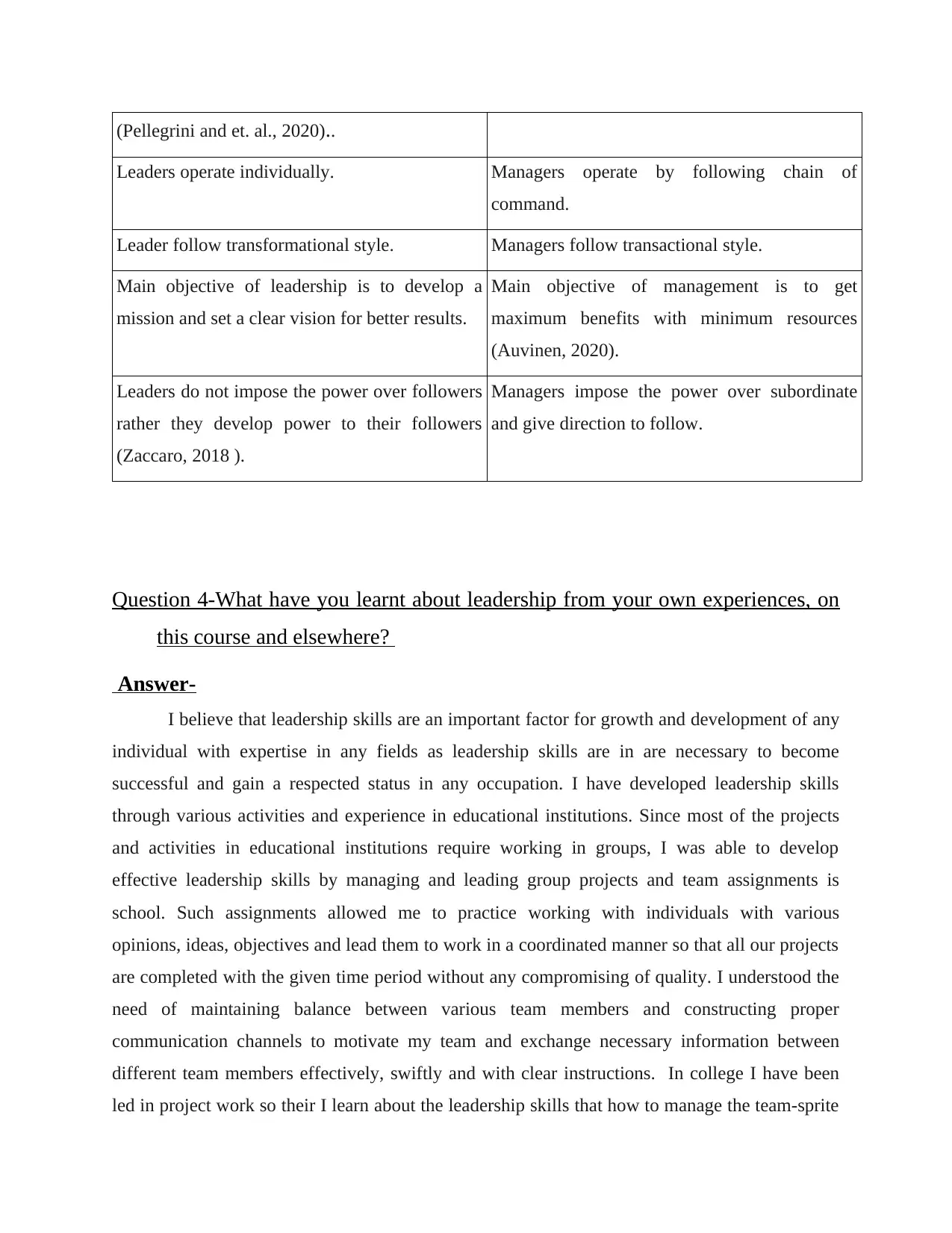
(Pellegrini and et. al., 2020)..
Leaders operate individually. Managers operate by following chain of
command.
Leader follow transformational style. Managers follow transactional style.
Main objective of leadership is to develop a
mission and set a clear vision for better results.
Main objective of management is to get
maximum benefits with minimum resources
(Auvinen, 2020).
Leaders do not impose the power over followers
rather they develop power to their followers
(Zaccaro, 2018 ).
Managers impose the power over subordinate
and give direction to follow.
Question 4-What have you learnt about leadership from your own experiences, on
this course and elsewhere?
Answer-
I believe that leadership skills are an important factor for growth and development of any
individual with expertise in any fields as leadership skills are in are necessary to become
successful and gain a respected status in any occupation. I have developed leadership skills
through various activities and experience in educational institutions. Since most of the projects
and activities in educational institutions require working in groups, I was able to develop
effective leadership skills by managing and leading group projects and team assignments is
school. Such assignments allowed me to practice working with individuals with various
opinions, ideas, objectives and lead them to work in a coordinated manner so that all our projects
are completed with the given time period without any compromising of quality. I understood the
need of maintaining balance between various team members and constructing proper
communication channels to motivate my team and exchange necessary information between
different team members effectively, swiftly and with clear instructions. In college I have been
led in project work so their I learn about the leadership skills that how to manage the team-sprite
Leaders operate individually. Managers operate by following chain of
command.
Leader follow transformational style. Managers follow transactional style.
Main objective of leadership is to develop a
mission and set a clear vision for better results.
Main objective of management is to get
maximum benefits with minimum resources
(Auvinen, 2020).
Leaders do not impose the power over followers
rather they develop power to their followers
(Zaccaro, 2018 ).
Managers impose the power over subordinate
and give direction to follow.
Question 4-What have you learnt about leadership from your own experiences, on
this course and elsewhere?
Answer-
I believe that leadership skills are an important factor for growth and development of any
individual with expertise in any fields as leadership skills are in are necessary to become
successful and gain a respected status in any occupation. I have developed leadership skills
through various activities and experience in educational institutions. Since most of the projects
and activities in educational institutions require working in groups, I was able to develop
effective leadership skills by managing and leading group projects and team assignments is
school. Such assignments allowed me to practice working with individuals with various
opinions, ideas, objectives and lead them to work in a coordinated manner so that all our projects
are completed with the given time period without any compromising of quality. I understood the
need of maintaining balance between various team members and constructing proper
communication channels to motivate my team and exchange necessary information between
different team members effectively, swiftly and with clear instructions. In college I have been
led in project work so their I learn about the leadership skills that how to manage the team-sprite
⊘ This is a preview!⊘
Do you want full access?
Subscribe today to unlock all pages.

Trusted by 1+ million students worldwide
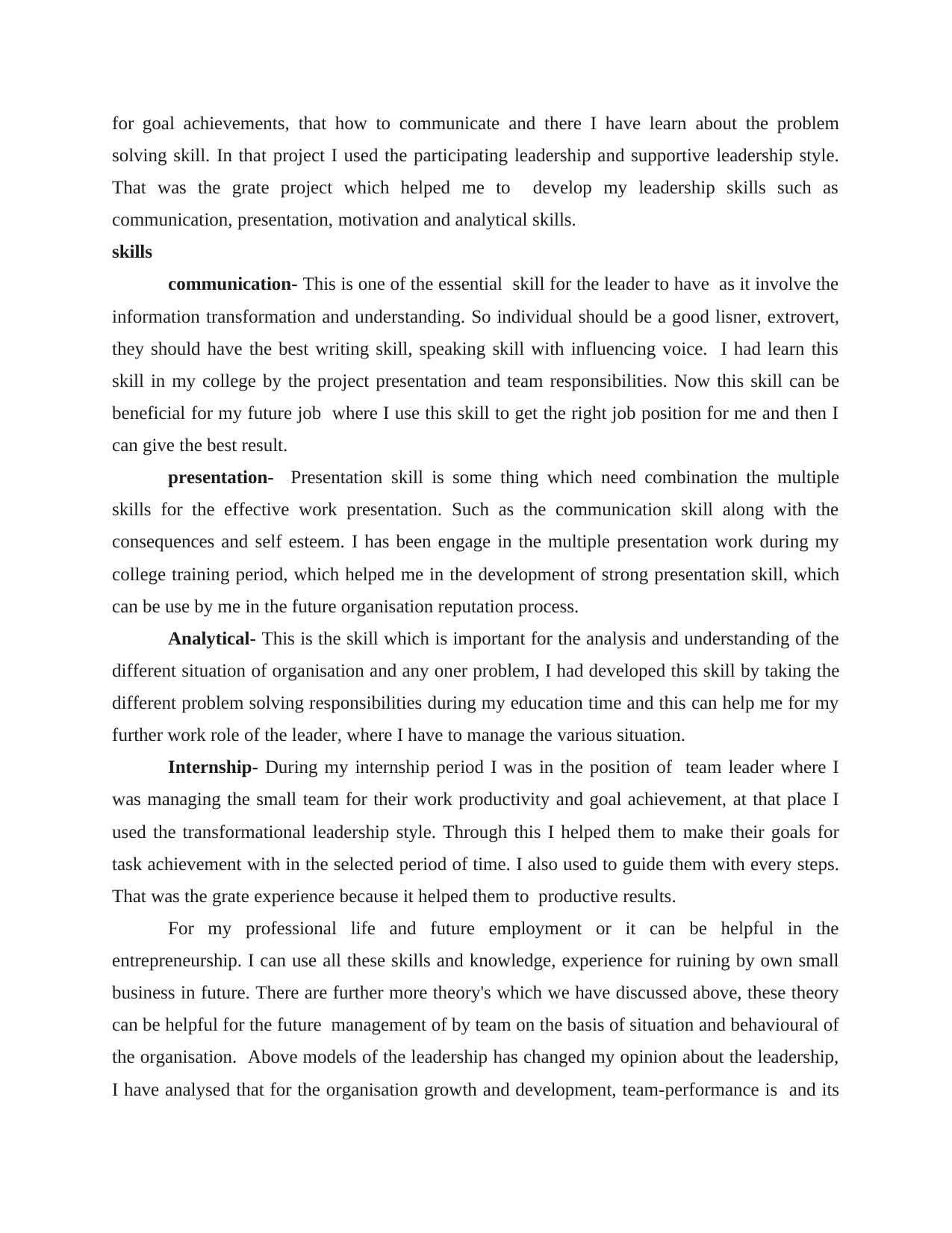
for goal achievements, that how to communicate and there I have learn about the problem
solving skill. In that project I used the participating leadership and supportive leadership style.
That was the grate project which helped me to develop my leadership skills such as
communication, presentation, motivation and analytical skills.
skills
communication- This is one of the essential skill for the leader to have as it involve the
information transformation and understanding. So individual should be a good lisner, extrovert,
they should have the best writing skill, speaking skill with influencing voice. I had learn this
skill in my college by the project presentation and team responsibilities. Now this skill can be
beneficial for my future job where I use this skill to get the right job position for me and then I
can give the best result.
presentation- Presentation skill is some thing which need combination the multiple
skills for the effective work presentation. Such as the communication skill along with the
consequences and self esteem. I has been engage in the multiple presentation work during my
college training period, which helped me in the development of strong presentation skill, which
can be use by me in the future organisation reputation process.
Analytical- This is the skill which is important for the analysis and understanding of the
different situation of organisation and any oner problem, I had developed this skill by taking the
different problem solving responsibilities during my education time and this can help me for my
further work role of the leader, where I have to manage the various situation.
Internship- During my internship period I was in the position of team leader where I
was managing the small team for their work productivity and goal achievement, at that place I
used the transformational leadership style. Through this I helped them to make their goals for
task achievement with in the selected period of time. I also used to guide them with every steps.
That was the grate experience because it helped them to productive results.
For my professional life and future employment or it can be helpful in the
entrepreneurship. I can use all these skills and knowledge, experience for ruining by own small
business in future. There are further more theory's which we have discussed above, these theory
can be helpful for the future management of by team on the basis of situation and behavioural of
the organisation. Above models of the leadership has changed my opinion about the leadership,
I have analysed that for the organisation growth and development, team-performance is and its
solving skill. In that project I used the participating leadership and supportive leadership style.
That was the grate project which helped me to develop my leadership skills such as
communication, presentation, motivation and analytical skills.
skills
communication- This is one of the essential skill for the leader to have as it involve the
information transformation and understanding. So individual should be a good lisner, extrovert,
they should have the best writing skill, speaking skill with influencing voice. I had learn this
skill in my college by the project presentation and team responsibilities. Now this skill can be
beneficial for my future job where I use this skill to get the right job position for me and then I
can give the best result.
presentation- Presentation skill is some thing which need combination the multiple
skills for the effective work presentation. Such as the communication skill along with the
consequences and self esteem. I has been engage in the multiple presentation work during my
college training period, which helped me in the development of strong presentation skill, which
can be use by me in the future organisation reputation process.
Analytical- This is the skill which is important for the analysis and understanding of the
different situation of organisation and any oner problem, I had developed this skill by taking the
different problem solving responsibilities during my education time and this can help me for my
further work role of the leader, where I have to manage the various situation.
Internship- During my internship period I was in the position of team leader where I
was managing the small team for their work productivity and goal achievement, at that place I
used the transformational leadership style. Through this I helped them to make their goals for
task achievement with in the selected period of time. I also used to guide them with every steps.
That was the grate experience because it helped them to productive results.
For my professional life and future employment or it can be helpful in the
entrepreneurship. I can use all these skills and knowledge, experience for ruining by own small
business in future. There are further more theory's which we have discussed above, these theory
can be helpful for the future management of by team on the basis of situation and behavioural of
the organisation. Above models of the leadership has changed my opinion about the leadership,
I have analysed that for the organisation growth and development, team-performance is and its
Paraphrase This Document
Need a fresh take? Get an instant paraphrase of this document with our AI Paraphraser
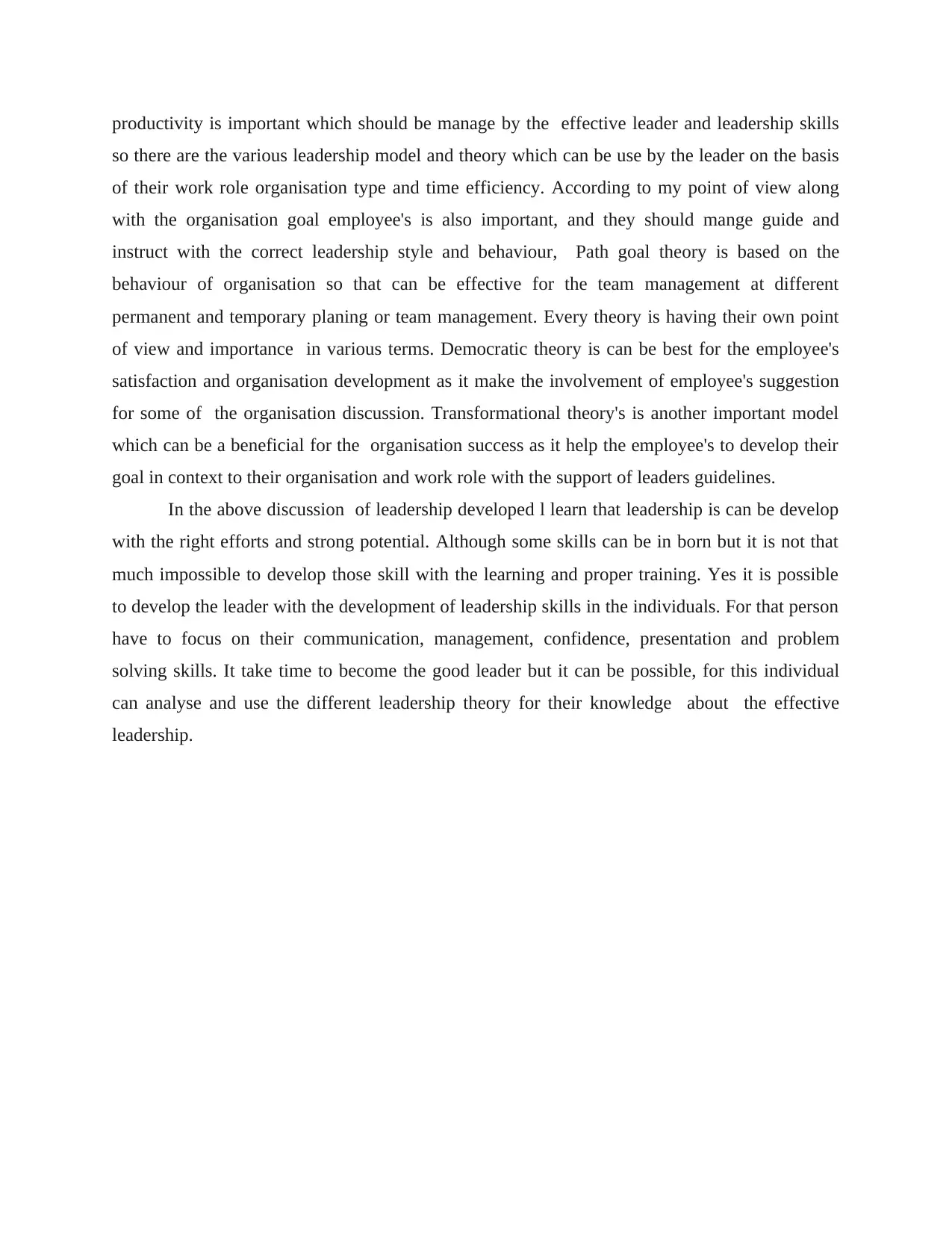
productivity is important which should be manage by the effective leader and leadership skills
so there are the various leadership model and theory which can be use by the leader on the basis
of their work role organisation type and time efficiency. According to my point of view along
with the organisation goal employee's is also important, and they should mange guide and
instruct with the correct leadership style and behaviour, Path goal theory is based on the
behaviour of organisation so that can be effective for the team management at different
permanent and temporary planing or team management. Every theory is having their own point
of view and importance in various terms. Democratic theory is can be best for the employee's
satisfaction and organisation development as it make the involvement of employee's suggestion
for some of the organisation discussion. Transformational theory's is another important model
which can be a beneficial for the organisation success as it help the employee's to develop their
goal in context to their organisation and work role with the support of leaders guidelines.
In the above discussion of leadership developed l learn that leadership is can be develop
with the right efforts and strong potential. Although some skills can be in born but it is not that
much impossible to develop those skill with the learning and proper training. Yes it is possible
to develop the leader with the development of leadership skills in the individuals. For that person
have to focus on their communication, management, confidence, presentation and problem
solving skills. It take time to become the good leader but it can be possible, for this individual
can analyse and use the different leadership theory for their knowledge about the effective
leadership.
so there are the various leadership model and theory which can be use by the leader on the basis
of their work role organisation type and time efficiency. According to my point of view along
with the organisation goal employee's is also important, and they should mange guide and
instruct with the correct leadership style and behaviour, Path goal theory is based on the
behaviour of organisation so that can be effective for the team management at different
permanent and temporary planing or team management. Every theory is having their own point
of view and importance in various terms. Democratic theory is can be best for the employee's
satisfaction and organisation development as it make the involvement of employee's suggestion
for some of the organisation discussion. Transformational theory's is another important model
which can be a beneficial for the organisation success as it help the employee's to develop their
goal in context to their organisation and work role with the support of leaders guidelines.
In the above discussion of leadership developed l learn that leadership is can be develop
with the right efforts and strong potential. Although some skills can be in born but it is not that
much impossible to develop those skill with the learning and proper training. Yes it is possible
to develop the leader with the development of leadership skills in the individuals. For that person
have to focus on their communication, management, confidence, presentation and problem
solving skills. It take time to become the good leader but it can be possible, for this individual
can analyse and use the different leadership theory for their knowledge about the effective
leadership.
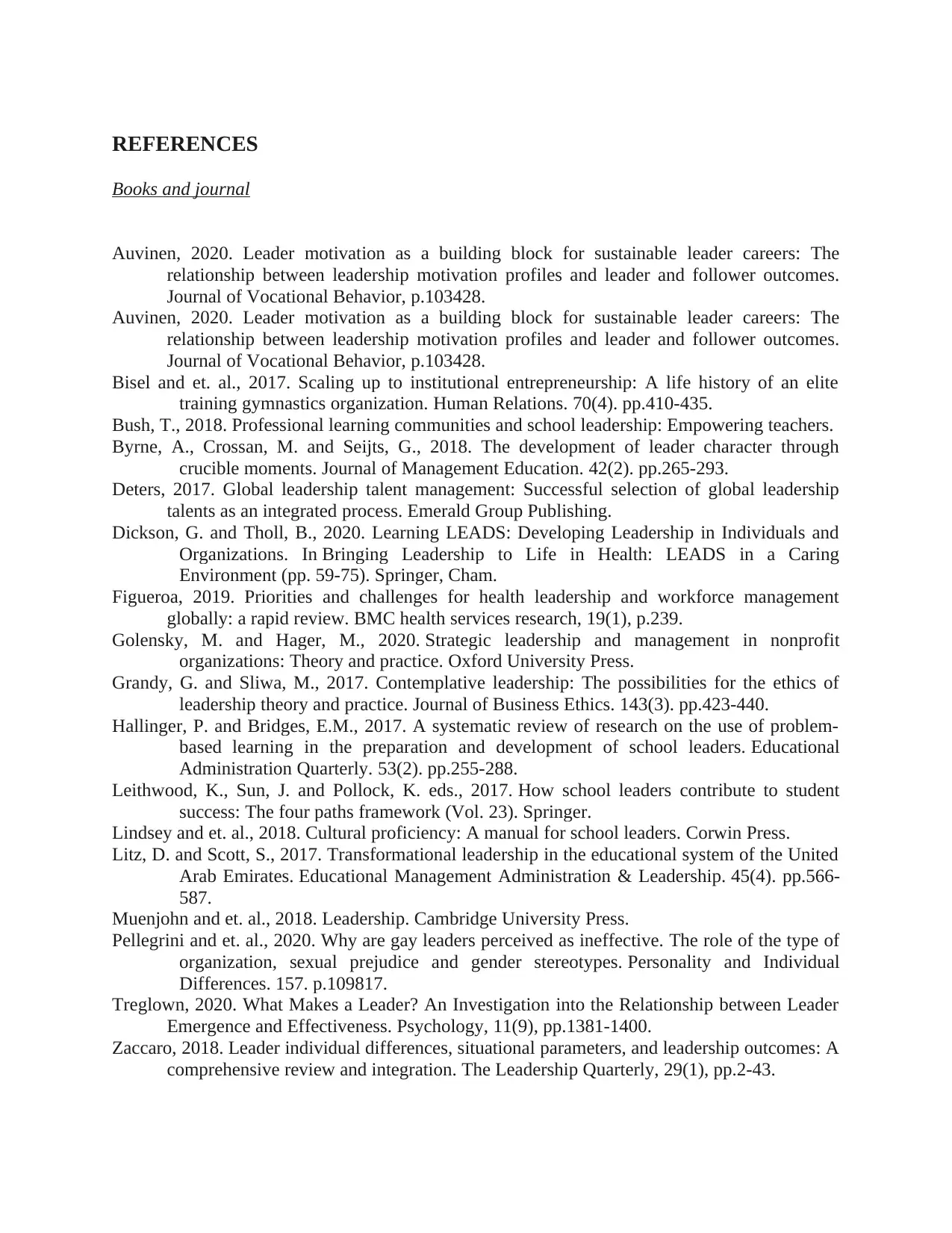
REFERENCES
Books and journal
Auvinen, 2020. Leader motivation as a building block for sustainable leader careers: The
relationship between leadership motivation profiles and leader and follower outcomes.
Journal of Vocational Behavior, p.103428.
Auvinen, 2020. Leader motivation as a building block for sustainable leader careers: The
relationship between leadership motivation profiles and leader and follower outcomes.
Journal of Vocational Behavior, p.103428.
Bisel and et. al., 2017. Scaling up to institutional entrepreneurship: A life history of an elite
training gymnastics organization. Human Relations. 70(4). pp.410-435.
Bush, T., 2018. Professional learning communities and school leadership: Empowering teachers.
Byrne, A., Crossan, M. and Seijts, G., 2018. The development of leader character through
crucible moments. Journal of Management Education. 42(2). pp.265-293.
Deters, 2017. Global leadership talent management: Successful selection of global leadership
talents as an integrated process. Emerald Group Publishing.
Dickson, G. and Tholl, B., 2020. Learning LEADS: Developing Leadership in Individuals and
Organizations. In Bringing Leadership to Life in Health: LEADS in a Caring
Environment (pp. 59-75). Springer, Cham.
Figueroa, 2019. Priorities and challenges for health leadership and workforce management
globally: a rapid review. BMC health services research, 19(1), p.239.
Golensky, M. and Hager, M., 2020. Strategic leadership and management in nonprofit
organizations: Theory and practice. Oxford University Press.
Grandy, G. and Sliwa, M., 2017. Contemplative leadership: The possibilities for the ethics of
leadership theory and practice. Journal of Business Ethics. 143(3). pp.423-440.
Hallinger, P. and Bridges, E.M., 2017. A systematic review of research on the use of problem-
based learning in the preparation and development of school leaders. Educational
Administration Quarterly. 53(2). pp.255-288.
Leithwood, K., Sun, J. and Pollock, K. eds., 2017. How school leaders contribute to student
success: The four paths framework (Vol. 23). Springer.
Lindsey and et. al., 2018. Cultural proficiency: A manual for school leaders. Corwin Press.
Litz, D. and Scott, S., 2017. Transformational leadership in the educational system of the United
Arab Emirates. Educational Management Administration & Leadership. 45(4). pp.566-
587.
Muenjohn and et. al., 2018. Leadership. Cambridge University Press.
Pellegrini and et. al., 2020. Why are gay leaders perceived as ineffective. The role of the type of
organization, sexual prejudice and gender stereotypes. Personality and Individual
Differences. 157. p.109817.
Treglown, 2020. What Makes a Leader? An Investigation into the Relationship between Leader
Emergence and Effectiveness. Psychology, 11(9), pp.1381-1400.
Zaccaro, 2018. Leader individual differences, situational parameters, and leadership outcomes: A
comprehensive review and integration. The Leadership Quarterly, 29(1), pp.2-43.
Books and journal
Auvinen, 2020. Leader motivation as a building block for sustainable leader careers: The
relationship between leadership motivation profiles and leader and follower outcomes.
Journal of Vocational Behavior, p.103428.
Auvinen, 2020. Leader motivation as a building block for sustainable leader careers: The
relationship between leadership motivation profiles and leader and follower outcomes.
Journal of Vocational Behavior, p.103428.
Bisel and et. al., 2017. Scaling up to institutional entrepreneurship: A life history of an elite
training gymnastics organization. Human Relations. 70(4). pp.410-435.
Bush, T., 2018. Professional learning communities and school leadership: Empowering teachers.
Byrne, A., Crossan, M. and Seijts, G., 2018. The development of leader character through
crucible moments. Journal of Management Education. 42(2). pp.265-293.
Deters, 2017. Global leadership talent management: Successful selection of global leadership
talents as an integrated process. Emerald Group Publishing.
Dickson, G. and Tholl, B., 2020. Learning LEADS: Developing Leadership in Individuals and
Organizations. In Bringing Leadership to Life in Health: LEADS in a Caring
Environment (pp. 59-75). Springer, Cham.
Figueroa, 2019. Priorities and challenges for health leadership and workforce management
globally: a rapid review. BMC health services research, 19(1), p.239.
Golensky, M. and Hager, M., 2020. Strategic leadership and management in nonprofit
organizations: Theory and practice. Oxford University Press.
Grandy, G. and Sliwa, M., 2017. Contemplative leadership: The possibilities for the ethics of
leadership theory and practice. Journal of Business Ethics. 143(3). pp.423-440.
Hallinger, P. and Bridges, E.M., 2017. A systematic review of research on the use of problem-
based learning in the preparation and development of school leaders. Educational
Administration Quarterly. 53(2). pp.255-288.
Leithwood, K., Sun, J. and Pollock, K. eds., 2017. How school leaders contribute to student
success: The four paths framework (Vol. 23). Springer.
Lindsey and et. al., 2018. Cultural proficiency: A manual for school leaders. Corwin Press.
Litz, D. and Scott, S., 2017. Transformational leadership in the educational system of the United
Arab Emirates. Educational Management Administration & Leadership. 45(4). pp.566-
587.
Muenjohn and et. al., 2018. Leadership. Cambridge University Press.
Pellegrini and et. al., 2020. Why are gay leaders perceived as ineffective. The role of the type of
organization, sexual prejudice and gender stereotypes. Personality and Individual
Differences. 157. p.109817.
Treglown, 2020. What Makes a Leader? An Investigation into the Relationship between Leader
Emergence and Effectiveness. Psychology, 11(9), pp.1381-1400.
Zaccaro, 2018. Leader individual differences, situational parameters, and leadership outcomes: A
comprehensive review and integration. The Leadership Quarterly, 29(1), pp.2-43.
⊘ This is a preview!⊘
Do you want full access?
Subscribe today to unlock all pages.

Trusted by 1+ million students worldwide
1 out of 13
Related Documents
Your All-in-One AI-Powered Toolkit for Academic Success.
+13062052269
info@desklib.com
Available 24*7 on WhatsApp / Email
![[object Object]](/_next/static/media/star-bottom.7253800d.svg)
Unlock your academic potential
Copyright © 2020–2025 A2Z Services. All Rights Reserved. Developed and managed by ZUCOL.



